初三英语课堂笔记(2)
初三英语知识点归纳以及重点词汇
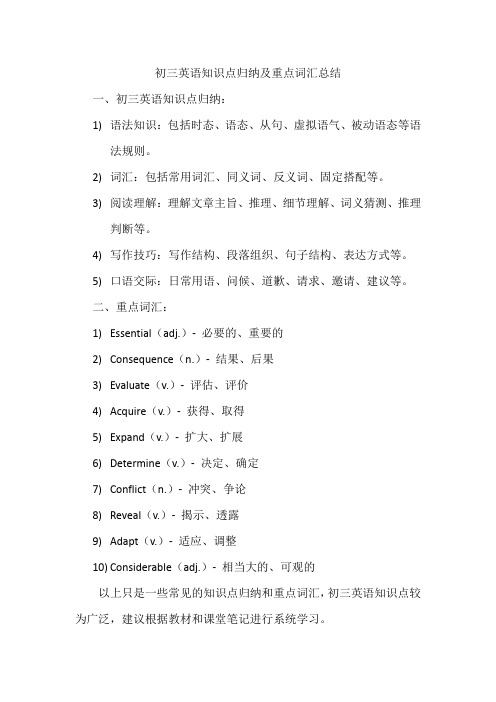
初三英语知识点归纳及重点词汇总结
一、初三英语知识点归纳:
1)语法知识:包括时态、语态、从句、虚拟语气、被动语态等语
法规则。
2)词汇:包括常用词汇、同义词、反义词、固定搭配等。
3)阅读理解:理解文章主旨、推理、细节理解、词义猜测、推理
判断等。
4)写作技巧:写作结构、段落组织、句子结构、表达方式等。
5)口语交际:日常用语、问候、道歉、请求、邀请、建议等。
二、重点词汇:
1)Essential(adj.)-必要的、重要的
2)Consequence(n.)-结果、后果
3)Evaluate(v.)-评估、评价
4)Acquire(v.)-获得、取得
5)Expand(v.)-扩大、扩展
6)Determine(v.)-决定、确定
7)Conflict(n.)-冲突、争论
8)Reveal(v.)-揭示、透露
9)Adapt(v.)-适应、调整
10)Considerable(adj.)-相当大的、可观的
以上只是一些常见的知识点归纳和重点词汇,初三英语知识点较为广泛,建议根据教材和课堂笔记进行系统学习。
初中英语课堂笔记初三九年级全一册 Unit1Unit2
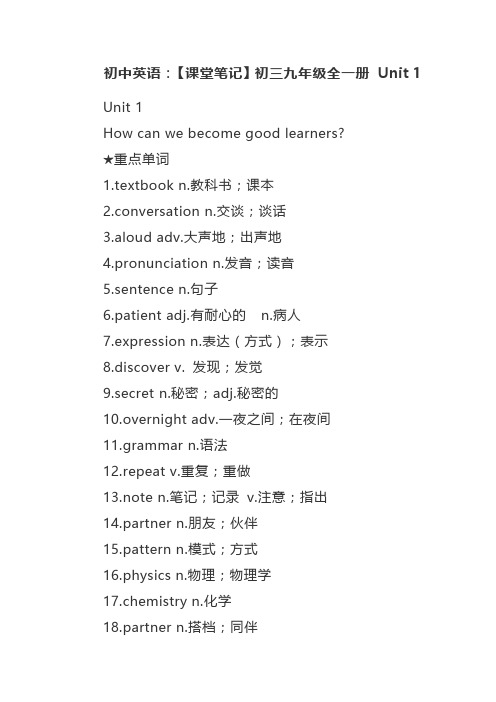
初中英语:【课堂笔记】初三九年级全一册Unit 1 Unit 1How can we become good learners?★重点单词1.textbook n.教科书;课本2.conversation n.交谈;谈话3.aloud adv.大声地;出声地4.pronunciation n.发音;读音5.sentence n.句子6.patient adj.有耐心的n.病人7.expression n.表达(方式);表示8.discover v. 发现;发觉9.secret n.秘密;adj.秘密的10.overnight adv.一夜之间;在夜间11.grammar n.语法12.repeat v.重复;重做13.note n.笔记;记录v.注意;指出14.partner n.朋友;伙伴15.pattern n.模式;方式16.physics n.物理;物理学17.chemistry n.化学18.partner n.搭档;同伴19.pronounce v.发音20.increase v.增加;增长21.speed n.速度v.加速22.ability n.能力;才能23.brain n.大脑24.active adj.活跃的;积极的25.attention n.注意;关注26.connect v.(使)连接;与…….有联系27.review v.& n.回顾;复习★重点短语1. have conversation with sb. 同某人谈话2. too…to… 太……而不能3. the secret to… ……的秘诀4. be afraid of doing sth./ be afraid to do sth. 害怕做某事5. look up 查阅6. repeat out loud 大声跟读7. make mistakes in 在……方面犯错误8. connect ……with… 把……和……连接/联系起来9. get bored 感到厌烦10. be stressed out 焦虑不安的11. pay attention to 注意;关注12. depend on 取决于;依靠13. the ability to do sth.. 做某事的能力★重点句型1.提建议的句子:①What/how about +doing sth? 做……怎么样?如:What/How about going shopping?②Why don't you+do sth? 你为什么不做……?如:Why don't you go shopping?③Why not+do sth? 为什么不做……?如:Why not go shopping?④Let's+do sth. 让我们做……吧。
九年级上册英语教研版m12笔记
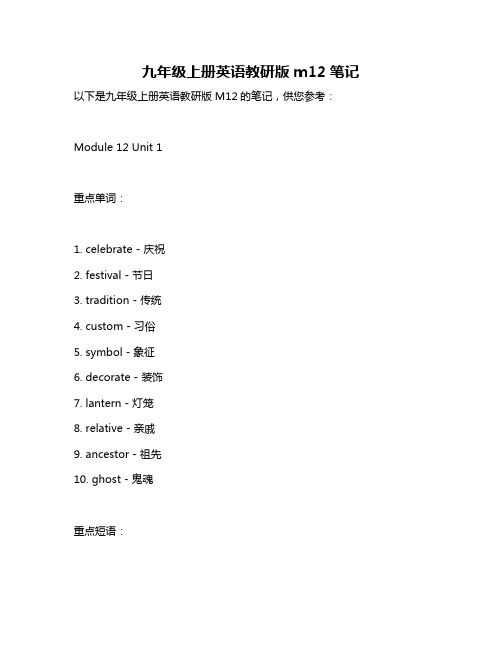
九年级上册英语教研版m12笔记以下是九年级上册英语教研版M12的笔记,供您参考:Module 12 Unit 1重点单词:1. celebrate - 庆祝2. festival - 节日3. tradition - 传统4. custom - 习俗5. symbol - 象征6. decorate - 装饰7. lantern - 灯笼8. relative - 亲戚9. ancestor - 祖先10. ghost - 鬼魂重点短语:1. celebrate the festival - 庆祝节日2. follow the tradition - 遵循传统3. observe the custom - 遵守习俗4. carry out the ceremony - 举行仪式5. in memory of - 为了纪念6. light the lanterns - 点灯笼7. tell the story of - 讲述故事8. visit relatives - 拜访亲戚9. pay respect to ancestors - 尊敬祖先10. tell ghost stories - 讲鬼故事重点句型:1. What are people in your country doing to celebrate the festival? - 在你们国家,人们是怎样庆祝这个节日的?2. In my country, we usually follow these traditions. - 在我国,我们通常遵循这些传统。
3. Do you think it is important to observe these customs? - 你认为遵守这些习俗重要吗?4. I think it is important to carry out these ceremonies. - 我认为举行这些仪式很重要。
江苏牛津初中英语9A Unit2课堂笔记
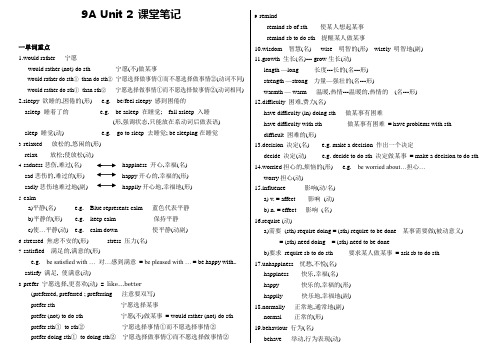
9A Unit 2 课堂笔记一单词重点1.would rather 宁愿would rather (not) do sth 宁愿(不)做某事would rather do sth①than do sth②宁愿选择做事情①而不愿选择做事情②(动词不同) would rather do sth①than sth②宁愿选择做事情①而不愿选择做事情②(动词相同) 2.sleepy 欲睡的,困倦的(形) e.g. be/feel sleepy 感到困倦的asleep 睡着了的 e.g. be asleep 在睡觉; fall asleep 入睡(形,强调状态,只能放在系动词后做表语)sleep 睡觉(动) e.g. go to sleep 去睡觉; be sleeping在睡觉3.relaxed 放松的,悠闲的(形)relax 放松;使放松(动)4.sadness悲伤,难过(名) happiness 开心,幸福(名)sad悲伤的,难过的(形) happy开心的,幸福的(形)sadly悲伤地难过地(副) happily开心地,幸福地(形)5.calma)平静(名) e.g. Blue represents calm 蓝色代表平静b)平静的(形) e.g. keep calm 保持平静c)使…平静(动) e.g. calm down 使平静(动副)6.stressed 焦虑不安的(形) stress 压力(名)7.satisfied 满足的,满意的(形)e.g. be satisfied with …对…感到满意= be pleased with … = be happy with.. satisfy 满足, 使满意(动)8.prefer 宁愿选择,更喜欢(动) = like…bette r(preferred, preferred ; preferring 注意要双写)prefer sth 宁愿选择某事prefer (not) to do sth 宁愿(不)做某事= would rather (not) do sthprefer sth①to sth②宁愿选择事情①而不愿选择事情②prefer doing sth①to doing sth②宁愿选择做事情①而不愿选择做事情②9.remindremind sb of sth 使某人想起某事remind sb to do sth 提醒某人做某事10.wisdom 智慧(名) wise 明智的(形) wisely 明智地(副)11.growth 生长(名)--- grow生长(动)length —long 长度---长的(名---形)strength —strong 力量—强壮的(名---形)warmth — warm 温暖,热情---温暖的,热情的(名---形)12.difficulty 困难,费力(名)have difficulty (in) doing sth 做某事有困难have difficulty with sth 做某事有困难= have problems with sthdifficult 困难的(形)13.decision 决定(名) e.g. make a decision 作出一个决定decide 决定(动) e.g. decide to do sth 决定做某事= make a decision to do sth 14.worried担心的,烦恼的(形) e.g. be worried about…担心…worry担心(动)15.influence 影响(动/名)a) v. = affect 影响(动)b) n. = effect 影响(名)16.require (动)a)需要(sth) require doing = (sth) require to be done 某事需要做(被动意义)= (sth) need doing = (sth) need to be doneb)要求require sb to do sth 要求某人做某事= ask sb to do sth17.unhappiness 忧愁,不悦(名)happiness 快乐,幸福(名)happy 快乐的,幸福的(形)happily 快乐地,幸福地(副)18.normally 正常地,通常地(副)normal 正常的(形)19.behaviour 行为(名)behave 举动,行为表现(动)20.promise允诺,答应a) (动) promise to do sth 答应做某事promise sb that…(加从句) 答应某人…I promise you . 我向你保证.b) (名) make a promise 许下诺言keep a promise 信守诺言21.successfully 成功地(副) do sth successfully成功地做某事successful 成功的(形) be successful 取得成功success 成功(名) bring you success 带给你成功succeed 成功(动) I will succeed 我将成功.22.advise 建议(动) e.g. advise sb to do sth 建议某人做某事advice 建议(名,不可数) e.g. give sb some advice 给某人一些建议23.perhaps 或许,可能(多用于句首)= maybe 或许,可能(多用于句首)= probably 或许,可能(多用于句中)24.thought 想法,主意(名)thoughtful 考虑周到的,体贴的(形)think 想,认为(动)25.protection 保护(名)protect 保护(动)二.语法重点(由some;any ;no 和every 可以与one ,body ,thing构成不定代词,它们的用法与some. any 的用法相同。
初中英语的教学随笔(5篇)
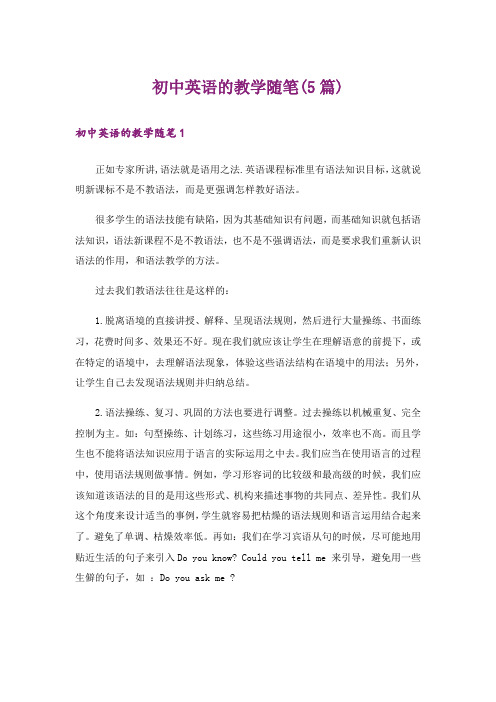
初中英语的教学随笔(5篇)初中英语的教学随笔1正如专家所讲,语法就是语用之法.英语课程标准里有语法知识目标,这就说明新课标不是不教语法,而是更强调怎样教好语法。
很多学生的语法技能有缺陷,因为其基础知识有问题,而基础知识就包括语法知识,语法新课程不是不教语法,也不是不强调语法,而是要求我们重新认识语法的作用,和语法教学的方法。
过去我们教语法往往是这样的:1.脱离语境的直接讲授、解释、呈现语法规则,然后进行大量操练、书面练习,花费时间多、效果还不好。
现在我们就应该让学生在理解语意的前提下,或在特定的语境中,去理解语法现象,体验这些语法结构在语境中的用法;另外,让学生自己去发现语法规则并归纳总结。
2.语法操练、复习、巩固的方法也要进行调整。
过去操练以机械重复、完全控制为主。
如:句型操练、计划练习,这些练习用途很小,效率也不高。
而且学生也不能将语法知识应用于语言的实际运用之中去。
我们应当在使用语言的过程中,使用语法规则做事情。
例如,学习形容词的比较级和最高级的时候,我们应该知道该语法的目的是用这些形式、机构来描述事物的共同点、差异性。
我们从这个角度来设计适当的事例,学生就容易把枯燥的语法规则和语言运用结合起来了。
避免了单调、枯燥效率低。
再如:我们在学习宾语从句的时候,尽可能地用贴近生活的句子来引入Do you know? Could you tell me 来引导,避免用一些生僻的句子,如:Do you ask me ?总之,新语法教学的机械操练应控制在一定范围之内,一节课不能太多,否则课堂会显得boring .反复训练、大量训练也解决不了问题教师只有将语法贴近生活,贴近学生,让学生全体参与,才能更好地进行语法教学。
初中英语的教学随笔2本学期我担任初三级68班英语教学。
由于教学经验颇浅,我对教学工作不敢怠慢,认真学习,深入研究教法,虚心学习。
经过一个学期的努力,获取了很多宝贵的教学经验。
以下是我在本学期的教学情况。
九年级上册英语第二单元笔记
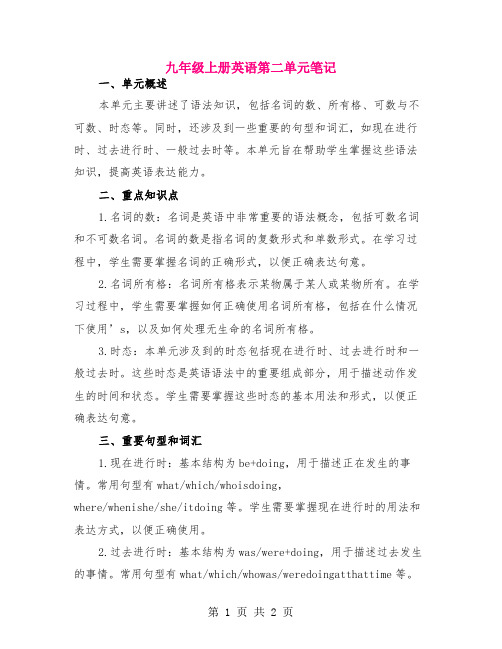
九年级上册英语第二单元笔记一、单元概述本单元主要讲述了语法知识,包括名词的数、所有格、可数与不可数、时态等。
同时,还涉及到一些重要的句型和词汇,如现在进行时、过去进行时、一般过去时等。
本单元旨在帮助学生掌握这些语法知识,提高英语表达能力。
二、重点知识点1.名词的数:名词是英语中非常重要的语法概念,包括可数名词和不可数名词。
名词的数是指名词的复数形式和单数形式。
在学习过程中,学生需要掌握名词的正确形式,以便正确表达句意。
2.名词所有格:名词所有格表示某物属于某人或某物所有。
在学习过程中,学生需要掌握如何正确使用名词所有格,包括在什么情况下使用’s,以及如何处理无生命的名词所有格。
3.时态:本单元涉及到的时态包括现在进行时、过去进行时和一般过去时。
这些时态是英语语法中的重要组成部分,用于描述动作发生的时间和状态。
学生需要掌握这些时态的基本用法和形式,以便正确表达句意。
三、重要句型和词汇1.现在进行时:基本结构为be+doing,用于描述正在发生的事情。
常用句型有what/which/whoisdoing,where/whenishe/she/itdoing等。
学生需要掌握现在进行时的用法和表达方式,以便正确使用。
2.过去进行时:基本结构为was/were+doing,用于描述过去发生的事情。
常用句型有what/which/whowas/weredoingatthattime等。
学生需要掌握过去进行时的用法和表达方式,以便在写作中正确使用。
3.一般过去时:基本结构为was/were+done或did+原形,用于描述过去发生的事情。
常用句型有what/which/whodid等。
学生需要掌握一般过去时的用法和表达方式,以便在口语和写作中正确使用。
4.词汇:本单元涉及到的词汇包括名词、动词、形容词等。
学生需要掌握这些词汇的拼写和用法,以便正确表达句意。
四、笔记总结本单元主要讲述了名词的数、所有格、时态等语法知识,以及一些重要的句型和词汇。
初中英语 牛津译林版7A Unit 2 Let’s play sports 课堂笔记
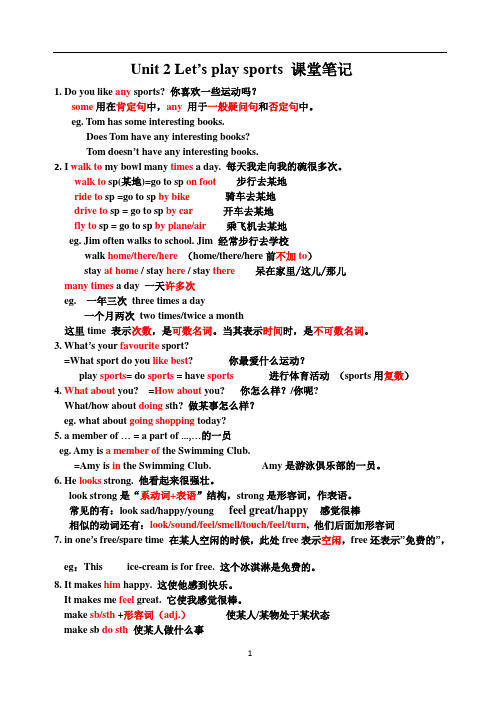
Unit 2 Let’s play sports课堂笔记1. Do you like any sports? 你喜欢一些运动吗?some用在肯定句中,any用于一般疑问句和否定句中。
eg. Tom has some interesting books.Does Tom have any interesting books?Tom doesn’t have any interesting books.2. I walk to my bowl many times a day. 每天我走向我的碗很多次。
walk to sp(某地)=go to sp on foot 步行去某地ride to sp =go to sp by bike骑车去某地drive to sp = go to sp by car开车去某地fly to sp = go to sp by plane/air乘飞机去某地eg. Jim often walks to school. Jim 经常步行去学校walk home/there/here(home/there/here前不加to)stay at home / stay here / stay there呆在家里/这儿/那儿many times a day 一天许多次eg. 一年三次three times a day一个月两次two times/twice a month这里time 表示次数,是可数名词。
当其表示时间时,是不可数名词。
3. What’s your favourite sport?=What sport do you like best? 你最爱什么运动?play sports= do sports = have sports 进行体育活动(sports用复数)4. What about you? =How about you? 你怎么样?/你呢?What/how about doing sth? 做某事怎么样?eg. what about going shopping today?5. a member of … = a part of ...,…的一员eg. Amy is a member of the Swimming Club.=Amy is in the Swimming Club. Amy是游泳俱乐部的一员。
新人教版九年级英语全册知识点总结 (课堂笔记)
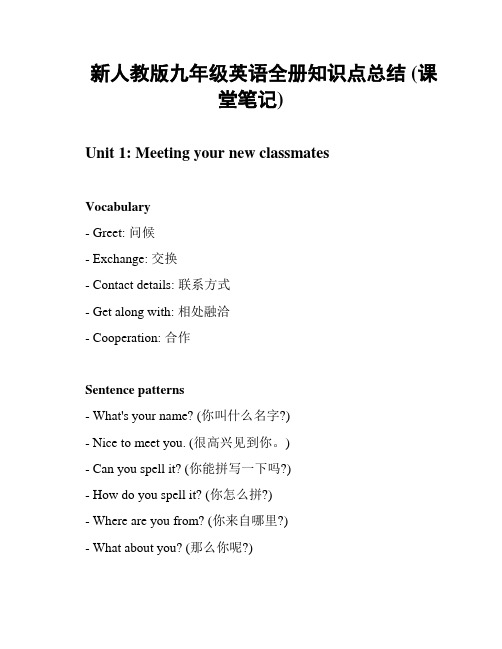
新人教版九年级英语全册知识点总结 (课堂笔记)Unit 1: Meeting your new classmatesVocabulary- Greet: 问候- Exchange: 交换- Contact details: 联系方式- Get along with: 相处融洽- Cooperation: 合作Sentence patterns- What's your name? (你叫什么名字?)- Nice to meet you. (很高兴见到你。
)- Can you spell it? (你能拼写一下吗?)- How do you spell it? (你怎么拼?)- Where are you from? (你来自哪里?)- What about you? (那么你呢?)- What's your phone number/email address? (你的电话号码/邮箱地址是多少?)- Let's exchange contact details. (咱们交换一下联系方式吧。
) - How do you like your new school? (你觉得新学校怎么样?)- I'm getting along well with my classmates. (我和同学相处得不错。
)Unit 2: School lifeVocabulary- Education: 教育- Facilities: 设施- Clubs: 社团- Activities: 活动- Schedule: 课程表Sentence patterns- Our school provides high-quality education. (我们学校提供高质量的教育。
)- We have modern facilities like a library, sports ground, and labs. (我们有现代化的设施,如图书馆、运动场和实验室。
英语语法-课堂笔记-名词部分

超级语法课堂笔记目录Day 1变身吧!名词们之【初识名词村】 (4)文字总结 (4)整体思维导图记忆 (5)Day 2变身吧!名词们之【名词结尾大作用】 (6)文字总结 (6)整体思维导图记忆 (7)Day 3变身吧!名词们之【变异的影分身】 (8)文字总结 (8)整体思维导图记忆 (9)Day 4变身吧!名词们之【名词的新本领】 (10)文字总结 (10)整体思维导图记忆 (11)DAY5 名词总结课【复习总结】 (12)冠词 (12)名词概念 (12)名词变复数 (12)名词所有格 (13)使用规则! (13)123Day 1变身吧!名词们之【初识名词村】文字总结A:涉及考点●名词单复数(一般,ch sh s x)●冠词(a, an, the)B : 本节课学习目标●知道并区分了解名词●熟知单复数的变换规则●会使用冠词C : 知识点1. 什么是名词?名词就是人或物的名字2. 名词分类名词分为专有名词和普通名词,其中普通名词又分为可数名词和不可数名词♈专有名词概念:专有名词是表示人、地方、事物等特有的名词,它的第一个字母要大写。
例如:人名:Tom,Peter,Mr Yang地名:Europe,New York ,People‘s Square节日、月份、星期:Christmas,February,Saturday♈普通名词:表示某些人,某类事物,某种物质或抽象概念的名称。
例如:teacher老师、tea茶3. 如何区分使用a an the?4a :用于辅音音素开头的单词(看音标识别)。
a book a pen a teacheran :用于元音音素开头的单词。
an egg an apple an elephantthe :特指人或物。
指具体的人或物(一说肯定知道,这个是什么)the man;作为了解the 的两种发音Before a consonant sound you say [ðə] 在辅音因素前面发[ðə]例如:the pearBefore a vowel sound you say [ði]在元音因素前面发[ði]例如:the apple4. 名词变复数◆一般的名词【普通尾巴】在结尾加s变为复数形式。
外研社版九年级英语课堂笔记 Module 1 Wonders of the world
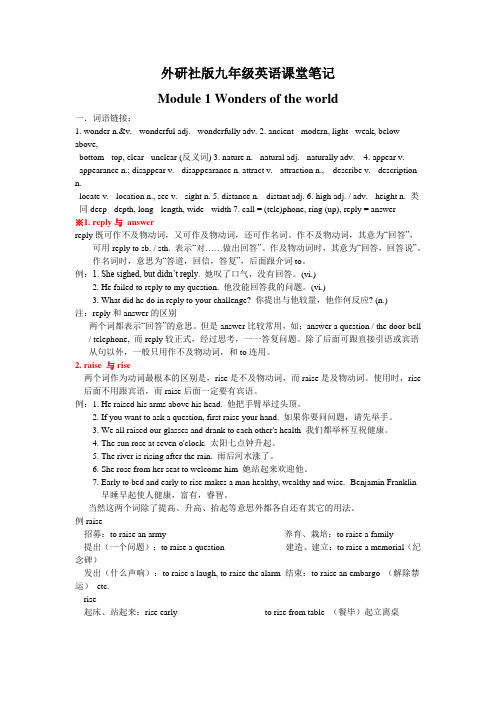
外研社版九年级英语课堂笔记Module 1 Wonders of the world一.词语链接:1. wonder n.&v. - wonderful adj. - wonderfully adv.2. ancient - modern, light - weak, below - above,bottom - top, clear - unclear (反义词) 3. nature n. - natural adj. - naturally adv. 4. appear v. - appearance n.; disappear v. - disappearance n. attract v. - attraction n., describe v. - description n.locate v. - location n., see v. - sight n. 5. distance n. - distant adj. 6. high adj. / adv. - height n. 类同deep - depth, long - length, wide - width 7. call = (tele)phone, ring (up), reply = answer※1. reply与answerreply既可作不及物动词,又可作及物动词,还可作名词。
作不及物动词,其意为“回答”,可用reply to sb. / sth. 表示“对……做出回答”。
作及物动词时,其意为“回答,回答说”。
作名词时,意思为“答道,回信,答复”,后面跟介词to。
例:1. She sighed, but didn’t reply. 她叹了口气,没有回答。
(vi.)2. He failed to reply to my question. 他没能回答我的问题。
(vi.)3. What did he do in reply to your challenge? 你提出与他较量,他作何反应? (n.)注:reply和answer的区别两个词都表示“回答”的意思。
英语课堂笔记及习题(形容词的比较形式 比较级,最高级,同级,成倍)

形容词的比较级和最高级一、含义绝大多数形容词有三种形式,原级,比较级和最高级,以表示形容词说明的性质在程度上的不同。
(1)形容词的原级:形容词的原级形式就是词典中出现的形容词的原形。
例如: poor,tall,great,bad。
(2)形容词的比较级:形容词的比较级表示“更……”,用于两者之间的比较,用来说明“前者比后者更……”,其句式为:“比较级+than”,即:物体A + be动词+ 形比+ than + 物体B。
She is more beautiful than my sister. 她比我的姐姐漂亮。
This bottle is bigger than that one. 这瓶子比那瓶子大。
(3)形容词的最高级:形容词的最高级表示“最......”,表示在三者或三者以上中程度最高,其句式为:the+形容词最高级+(名词)+表示范围的短语或从句,即:物体A + be动词+ the + 形最高级+(名词)+比较范围(of + 人/物,in +地方)Lucy is the most beautiful girl in her school. 露西是她学校最漂亮的女孩。
Jim is the thinnest of the three boys. 吉姆是这三个男孩中最瘦的。
二、比较级和最高级的规则变化(1)单音节和少数双音节形容词变化规则如下:(2)多音节词和部分双音节词变化规则如下:(3)少数不规则变化如下:二、形容词的比较形式1. 比较级:(1) be动词+比较级+than 用于表达“...比...更如何”I am taller than you. 我比你高。
(2) the + 比较级+ of the two表示“两个中比较……的He is the better of the two . 他是这两个人中比较好的。
2. 最高级:be动词+ the + 最高级+ (名词) +比较范围(of + 人/物,in +地方) 用于表达“在...中最......”I am the tallest in our class. 我是我们班里个子最高的。
20181122译林版初中英语九年级上册Unit 2课堂笔记
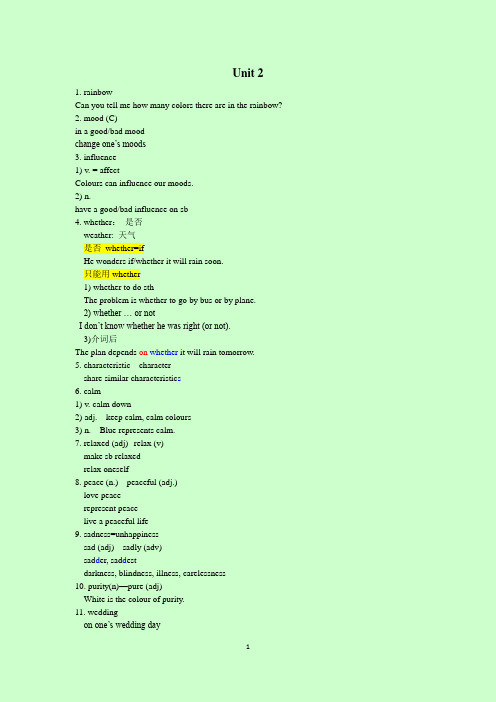
Unit 21. rainbowCan you tell me how many colors there are in the rainbow?2. mood (C)in a good/bad moodchange one’s moods3. influence1) v. = affectColours can influence our moods.2) n.have a good/bad influence on sb4. whether:是否weather: 天气是否whether=ifHe wonders if/whether it will rain soon.只能用whether1) whether to do sthThe problem is whether to go by bus or by plane.2) whether … or notI don’t know whether he was right (or not).3)介词后The plan depends on whether it will rain tomorrow.5. characteristic---charactershare similar characteristic s6. calm1) v. calm down2) adj. keep calm, calm colours3) n. Blue represents calm.7. relaxed (adj)--relax (v)make sb relaxedrelax oneself8. peace (n.)---peaceful (adj.)love peacerepresent peacelive a peaceful life9. sadness=unhappinesssad (adj)---sadly (adv)sad d er, sad d estdarkness, blindness, illness, carelessness10. purity(n)—pure (adj)White is the colour of purity.11. weddingon one’s wedding dayat the wedding12. prefer : like sth better prefer r ing prefer r ed1) prefer to do sth 更喜欢做某事2) prefer A to B 喜欢A胜于BI prefer English to Maths.( ) ---Which do you prefer, coffee or tea? ---I prefer tea ____ coffee.A. toB. withC. intoD. without( ) ---Which do you prefer, juice or milk? --- I prefer milk ____ sugar.A. toB.withC. intoD. on3) prefer doing A to doing B 宁愿做A事而不愿做B事prefer to do A rather than do Bwould rather do A than do BHe prefers running to watching TV.13. would rather do sthwould rather not do sth1. a girl’s colour2. There’s nothing wrong with pink.=Nothing is wrong with pink.3. try on试穿(代词放中间)4. Blue looks good on you.=You look good in blue.14. create (v)---creative (adj)create a warm and comfortable feelingcreate a file 文件15. feeling (n)---feel (v)hurt one’s feelingsdescribe your feelings16. cheer upcheer sb up17. remind:help remember or make sb think of sthremind sb of sth 使某人想起某事remind sb to do sth 提醒某人做某事18. wisdom (n)--wise (adj)--wisely(adv)Yellow represents wisdom.a man of wisdom=a wise man19. as1) 作为As a doctor, we can’t be too careful.2) 像……一样as…as He is as tall as I.You can do as what he told you.3) such as例如4) 因为Green can give you energy, as it is the colour of nature.20. envygreen with envy21. require 行为动词=needrequire to do sthrequire sb to do sthrequire doing sth=require to be done22.strength (n)---strong (adj)=power (n)23. heat (n)---hot (adj)---hotter, hottestThe sun gives us light and heat.24. difficulty (n)---difficult (adj)have difficulty with sthhave difficulty/ problems, trouble (in) doing sthdifficulty “困难” 不可数“难点” 可数--What difficulty do you have in Xian?-- ________ the way to the park. (find)25. decision (n)---decide (v)decide to do sth=make up one’s mind(s) to do sth=make a decision to do sth 决定做某事A matchesB very well.=A and B are a good match.=A goes well with Bgeneral idea=main idea主旨,大意Reading1. the power of colourspower=strength力量2. in a magazine/newspaper/bookon the paper在纸上3. Color makes us feel happy.--We are made to feel happy by color.4. feel sleepy感到瞌睡---felt, feltfall asleep入睡---fell, fallena sleeping bag 睡袋5. explain---explainingexplain sth to sb6. walk into=enter7. relaxed: adj.指sbrelaxing: adj指sth8. be painted bluepaint the walls blue9. bring sth to sb=bring sb sth10. our mind and body我们的身心mind:1)大脑,心灵(不可数)go through my mind2)主意(可数)make up their minds to do sth3) V. 介意mind doing sth---Do you mind me/my smoking here?--- Please don’t. / You’d better not.Not at all./ Of course not.11.He prefers watching TV to _____ (do) his homework. He prefers staying at home to _____(watch) TV.1)---Do you prefer milk____ coffee?---Neither.2) ---Do you prefer coffee_____ milk?---Yes. I think it’s less delicious without it.3) ---Do you prefer coffee ____ milk?---Yes. Please get me a cup of it.12. hope for sth=look forward to sth期待……13. if: 如果,状语从句,主将从现是否,宾语从句,时态视情况而定I wonder if he ____ (come) tomorrow.If he ____(come) tomorrow, I will tell you.when:何时,宾语从句当…时候,时间状语从句Tell me when he (arrive) here.When he (arrive) here,I (tell ) you.14. be of help to sb=be helpful to sbof+n =adjof importance=importantof use=useful15. ask sb for help向某人求助16. too tired to move17. be/feel sure about sth18. get into trouble19. fight with each otherGrammar1. relation shipthe relationship between A and Bfriendship2. certainly (adv)---certain (adj)Certainly.=Of course.=Sure.Certainly not. 当然不。
九年级上册英语笔记
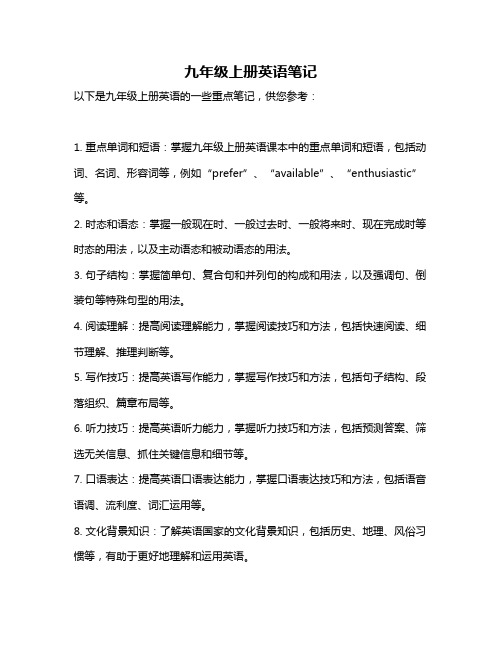
九年级上册英语笔记
以下是九年级上册英语的一些重点笔记,供您参考:
1. 重点单词和短语:掌握九年级上册英语课本中的重点单词和短语,包括动词、名词、形容词等,例如“prefer”、“available”、“enthusiastic”等。
2. 时态和语态:掌握一般现在时、一般过去时、一般将来时、现在完成时等时态的用法,以及主动语态和被动语态的用法。
3. 句子结构:掌握简单句、复合句和并列句的构成和用法,以及强调句、倒装句等特殊句型的用法。
4. 阅读理解:提高阅读理解能力,掌握阅读技巧和方法,包括快速阅读、细节理解、推理判断等。
5. 写作技巧:提高英语写作能力,掌握写作技巧和方法,包括句子结构、段落组织、篇章布局等。
6. 听力技巧:提高英语听力能力,掌握听力技巧和方法,包括预测答案、筛选无关信息、抓住关键信息和细节等。
7. 口语表达:提高英语口语表达能力,掌握口语表达技巧和方法,包括语音语调、流利度、词汇运用等。
8. 文化背景知识:了解英语国家的文化背景知识,包括历史、地理、风俗习惯等,有助于更好地理解和运用英语。
希望这些笔记能对您的学习有所帮助。
初三英语笔记重点归纳
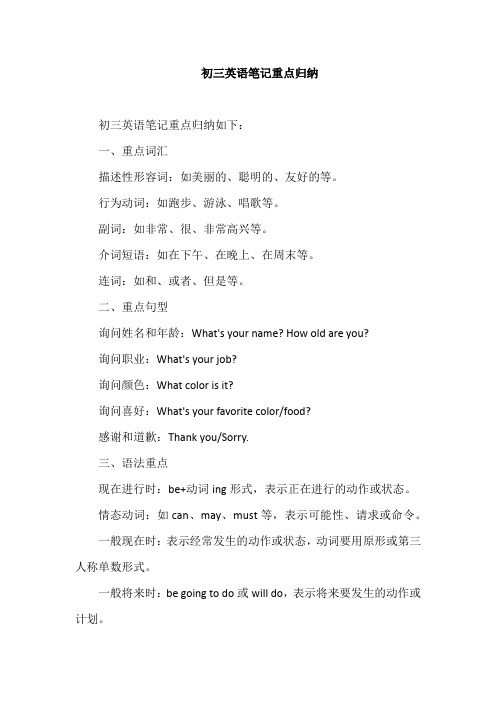
初三英语笔记重点归纳
初三英语笔记重点归纳如下:
一、重点词汇
描述性形容词:如美丽的、聪明的、友好的等。
行为动词:如跑步、游泳、唱歌等。
副词:如非常、很、非常高兴等。
介词短语:如在下午、在晚上、在周末等。
连词:如和、或者、但是等。
二、重点句型
询问姓名和年龄:What's your name? How old are you?
询问职业:What's your job?
询问颜色:What color is it?
询问喜好:What's your favorite color/food?
感谢和道歉:Thank you/Sorry.
三、语法重点
现在进行时:be+动词ing形式,表示正在进行的动作或状态。
情态动词:如can、may、must等,表示可能性、请求或命令。
一般现在时:表示经常发生的动作或状态,动词要用原形或第三人称单数形式。
一般将来时:be going to do或will do,表示将来要发生的动作或计划。
现在完成时:have/has done,表示已经完成的动作或状态。
四、常用短语
have a good time/enjoy oneself/have fun:表示玩得开心。
see you later/goodbye:表示再见。
have to do sth:表示不得不做某事。
want to do sth:表示想要做某事。
like to do sth/like doing sth:表示喜欢做某事。
以上是初三英语笔记的重点归纳,希望对你有所帮助。
英语二语法(课堂笔记)

*背单词:带入句子,语境背诵法BBC音标教学视频长元音(共20个)单元音长元音:/ɑ://ɔ:/ /ɜ:/ /i:/ /u:/短元音:/ʌ/ /ɒ/ /ə/ /ɪ/ /ʊ/ /e/ /æ/双元音:/eɪ/ /aɪ/ /ɔɪ/ /ɪə/ /eə/ /ʊə/ /əʊ/ /aʊ/ 辅音(28个)清辅音/p/ /t/ /k/ /f/ /θ/ /s/浊辅音/b/ /d/ /g/ /v/ /ð/ /z/轻辅音/ʃ/ /h/ /ts/ /tʃ/ /tr/浊辅音/ʒ/ /r/ /dz/ /dʒ/ /dr/鼻音/m/ /n/ /ŋ/半元音/j/ /w/边音/l/句子成分主谓宾定状补表同句法目的句子分类简单句(5)结构并列句复合句状语从句一、构词法1、派生词:前缀决定意思,后缀决定词性。
2、合成词:多个词在一起,可以理解其几个词的意思总和3、转化词:词形不变,词性变(在句子中的词性不同)二、*词性(五六大题):共10个;我要代表世界(介)告诉你,行(形)动要名副其实,速(数)度要连贯(冠)有序。
感叹词啊!!!!!(一)、名词(n)1、名词的数(可数n而言)单-复(黑人英雄爱吃土豆西红柿)规则变化不规则变化(1)内部元音变化的名词:foot-feet goose-geese man-men woman-women mouse-mice Policewoman-policewomen tooth-teeth(2)单复数形式相同的词:deer-deer grouse-grouse plaice-plaice salmon-salmontrout-trout sheep-sheep craft-craft Chinese-Chinese Swiss-Swiss 2、名词的格’s/s’属格=adj= n’s+n 意思是……的,形容词修饰名词of属格A of B 结构,翻译为(B的A)作宾语(成分):置于谓语v(动词)之后的成分作主语,表语?adj n / adj n adj adj n(二)、冠词(art)虚词-不作为成分*定冠词the不定冠词a/an +nthe/a/an+adj +n(book)(三)、代词(pron)1.人称代词2.*物主代词3.反身代词4.*指示代词:指示说明近处或者远处、上文或者下文、以前或者现在的人或物this/that +n单those/these +n复5.相互代词:6.疑问代词:用来提出问的的代词成为疑问代词who/whom/whose/what/which8.不定代词:不指明所代替的名词或形容词。
20181122译林版初中英语九年级上册Unit2课堂笔记
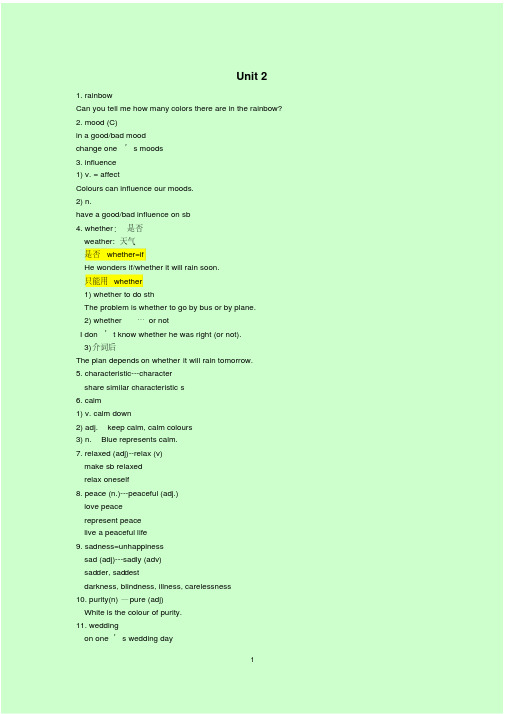
16. cheer up
cheer sb up
17. remind:
help remember or make sb think of sth
remind ห้องสมุดไป่ตู้b of sth 使某人想起某事
remind sb to do sth 提醒某人做某事
18. wisdom (n)--wise (adj)--wisely(adv)
Unit 2
1. rainbow Can you tell me how many colors there are in the rainbow? 2. mood (C) in a good/bad mood change one ’ s moods 3. influence 1) v. = affect Colours can influence our moods. 2) n. have a good/bad influence on sb 4. whether: 是否
3) such as 例如
4) 因为
2
Green can give you energy, as it is the colour of nature.
20. envy
green with envy
21. require 行为动词 =need require to do sth
require sb to do sth
24. difficulty (n)---difficult (adj)
14. create (v)---creative (adj)
create a warm and comfortable feeling
create a file 文件 15. feeling (n)---feel (v)
九年级冀教版英语第二单元手写课堂笔记
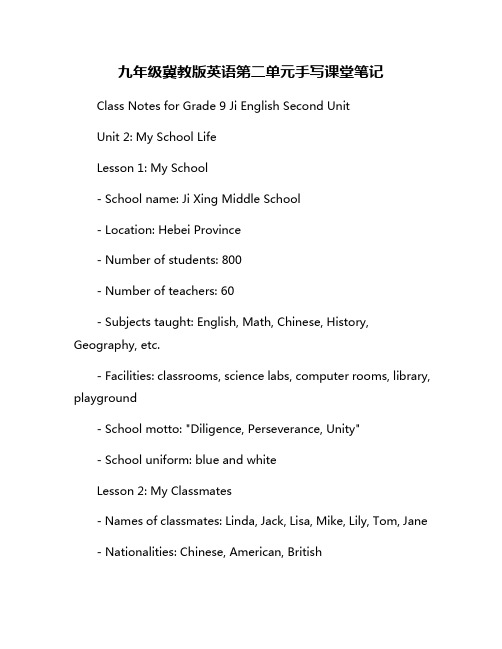
九年级冀教版英语第二单元手写课堂笔记Class Notes for Grade 9 Ji English Second UnitUnit 2: My School LifeLesson 1: My School- School name: Ji Xing Middle School- Location: Hebei Province- Number of students: 800- Number of teachers: 60- Subjects taught: English, Math, Chinese, History, Geography, etc.- Facilities: classrooms, science labs, computer rooms, library, playground- School motto: "Diligence, Perseverance, Unity"- School uniform: blue and whiteLesson 2: My Classmates- Names of classmates: Linda, Jack, Lisa, Mike, Lily, Tom, Jane- Nationalities: Chinese, American, British- Hobbies: reading, playing sports, painting, singing- Personalities: friendly, helpful, outgoing, shy, quiet- Relationships: close friends, acquaintances, classmatesLesson 3: My Teachers- Names of teachers: Mr. Wang, Ms. Li, Mrs. Liu, Mr. Zhang- Subjects taught: English, Math, Chinese, History- Teaching styles: interactive, engaging, informative- Classroom rules: no talking during class, raise hand to ask question, be respectful- Teacher-student relationships: supportive, encouraging, mentorshipLesson 4: My Daily Routine- Wake up at 6:30 AM- Breakfast at 7:00 AM- Classes start at 8:00 AM- Lunch break at 12:00 PM- Afternoon classes from 2:00 PM to 4:00 PM- Extracurricular activities: sports, music, art- Homework and study time in the evening- Bedtime at 10:00 PMOverall, my school life at Ji Xing Middle School is filled with learning, friendship, and growth. I am grateful for the opportunities and experiences that come with being a student here.。
- 1、下载文档前请自行甄别文档内容的完整性,平台不提供额外的编辑、内容补充、找答案等附加服务。
- 2、"仅部分预览"的文档,不可在线预览部分如存在完整性等问题,可反馈申请退款(可完整预览的文档不适用该条件!)。
- 3、如文档侵犯您的权益,请联系客服反馈,我们会尽快为您处理(人工客服工作时间:9:00-18:30)。
初三英语课堂笔记(2)
一练习题知识点:
1.There is /are sth. left
2.我手表坏了。
三种表达
My watch doesn’t work./My watch id broken./ There is something wrong with my watch.
3.and/or/but 前后句子时态和数一致。
4.be friendly to sb./be kind to sb.
二课文
1.many+ns=many of the ns (ns名词复数)
2.in the past 在过去
3.只对adj. 提问用how=what…like?
对adj.+n 中的adj.提问用which
He is awful. How is he?
He is a handsome boy. Which boy is he?
5.英语中的五个“喜欢做某事”
like/ love/ enjoy/ have fun/ be fond of / +doing
6.what a (adj.) n +主+谓! / How adj./adv. +主+谓!
7.decide to 决定做某事
8.walk up to the top 向上走到山顶
9.Start raining 开始下雨start doing 开始做某事
10.o ver=more than 多于……
11.when “当”引导时间状语从句。
从句,就是用一
个句子充当句子中的某个成分。
用一个句子做主句的时间,主句没有引导词,从句有引导词。
When he comes I will beat him.
(状语从句的一个特点:主将从现)
条件状语从句:当一件事儿发生,另一件事儿才
能发生,前面的事情就是条件状语从句。
If I have ability, I will destroy the earth.
When he comes, I will beat him.
When we got the top. It was raining hard.
When一过,主过进
练习:用play填空
1.) He enjoys______________.
2.) We ___________last week.
3.) They ___________tomorrow.
4.) Everyone ______always________.
5.) He ________when she walks.
6.) He ________when she walked.
7.) If she _______ , I will go.
8.) When she goes, I ________. 9.He had better ________.
10.) I have to ________________.
11.) He is ________________.
12.) He practices ________________.
13.) He plans _____________.
14.) He is fond of _________________.
15.) She _______________last month.
12.o ne bowl of rice 一碗大米饭
13.hard=heavily
14.It’s raining cats and dogs. = It’s pouring.
15.美元-dollar;英镑-pound;元-yuan
I borrow 200 dollars from you.
I lend you 200 yuan to you.
16.
做做买;选唱跳;
cook make buy; choose sing dance;
准备画; 找到用得到
prepare draw; find use get
命令
order 要用for!
She makes us tea.
She makes tea for us.
给送给递给交给和教给
Give send pass hand teach
拿来拿去还回与借给
bring take return lend
告诉展示喂养承诺卖
tell show feed promise sell 用to别怠慢!给我一本书。
Give me a book.= Give a book to me.。
